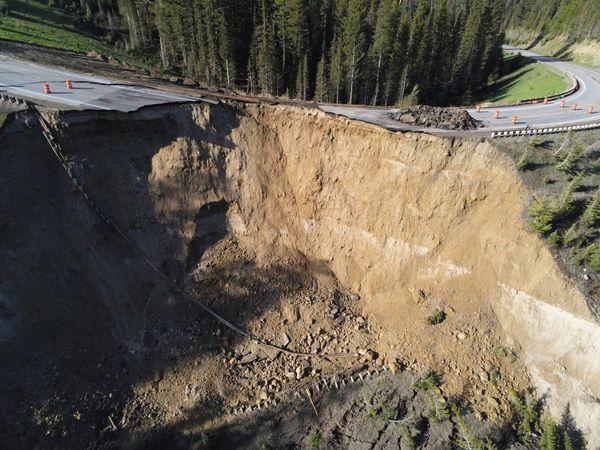
Becky Hill glides up on an ebike in full pop star clobber: leather flares, black strap top with enormous silver buckles, immaculately tousled hair, light green contacts that bestow a feline air. We were supposed to be meeting at her tour manager’s flat in London, so she seems slightly alarmed when I approach her on the street. It’s a feeling that quickly becomes mutual: as we wait to be buzzed inside, Hill directs most of her chat towards her phone screen or the wall. I wonder, perhaps, if she is all interviewed out; she is now knee-deep in promo for her second album, Believe Me Now?. “Well, the job is 80% press,” she says, matter-of-factly, once we are safely on a sofa inside. “But I wouldn’t want it any other way,” she adds, unconvincingly.
Hill is one of the UK’s most successful musicians. She has two Brit awards and 12 Top 20 singles to her name, an almost sold-out arena tour in the pipeline and some incredible listening stats (in 2021, she was the third-most streamed British female solo artist after Adele and Dua Lipa). Yet while her instantly memorable dance anthems have soundtracked the big nights out of millions of Britons, the 30-year-old is keenly aware that she doesn’t have the public profile to match her vocal ubiquity.
In the past, Hill has attributed her lack of fame to not being as “aspirational” as her peers – and you can see her point. She may be impeccably groomed, but she is certainly not the blandly positive, slickly on-message cheerleader of herself that you might expect. She turns out to be a gift of an interviewee: funny, direct and fiercely unfiltered – unwilling to gloss over any of the grim or entertainingly bizarre details of her decade-long slog towards dance music dominion.
Her journey began in a music shop in Kidderminster, Worcestershire, where Hill started taking guitar lessons at 10. “Have you ever seen Louis Theroux’s very old documentary on Thai brides?” she asks, suddenly. “Well, the owner was on it. He looked like Timmy Mallett and ran a Thai bride company from the guitar shop.” By her mid-teens, Hill was having singing lessons funded by a friend’s stepdad, a former music manager. His support led to her joining a decidedly strange band called Shaking Trees – alongside a 30-year-old “cake scientist”, a 26-year-old Russian chef and a 48-year-old drummer who restored antiques.
By this point, Hill was increasingly worried about the prospect of going to university, which was her idea of hell: “You’re thrown into a housing complex with other children and you have to make friends with them through the means of drinking alcohol and getting chlamydia.” Hill says she has never struggled to make friends, but is “very choosy”. For this and other reasons, she was “desperately depressed” in 2011 when she turned up at the Birmingham Hilton to audition for the first series of The Voice, viewing it as a potential escape route from higher education and small-town malaise in Worcestershire.
She was also under the impression that the BBC’s answer to The X Factor wouldn’t require a sob story (“because I didn’t have a dog with three legs or a nan who had died”) and that nobody would see her face (she says she was “incredibly insecure”). “It turned out you needed both of those things.”
In the event – despite the producers unsuccessful attempts to pump her for a tear-jerking tale – Hill had the time of her life. The moment the judges Jessie J and will.i.am turned their chairs around at her blind audition was the moment she realised music could be “a viable option”. With her strong, smoky vocals – still her calling card – she made it to the semi-finals, but she had heard that the show made no contact with its contestants after they were eliminated. “I remember thinking: fuck, I’ve got to do something here. I’ve got to make sure that I can knock on doors and knock down doors.”
For anyone still under the impression that the 2010s talent show circuit was a shortcut to a cushy music career, let Hill disabuse you of that notion once and for all. She spent the months after her appearance crashing at a fellow contestant’s council house in Harrow, north-west London, where she slept on the bottom bunk in their child’s bedroom, while looking for a manager. She found one – and in the process of courting labels became significantly indebted to him. “By the time I got my first record deal, I owed him 12 grand,” she says. “I hated that. I’ve still got emails from then saying: I’ve got this YouTube thing, can I borrow £35 to get a top from Matalan?”
By then, she was lodging with a couple in Cricklewood, half an hour away. “She was seven months pregnant and he walked out on her. She’d be smoking Marlboro Reds out the back door asking for advice,” Hill says. “That situation sent me back down a bit of a black hole.”
It was a tough but productive period. By the end, Hill, still a teenager, was playing live with Rudimental and had scored her first Top 10 single, co-writing and singing on Wilkinson’s double-platinum drum’n’bass smash Afterglow. The problem was, you wouldn’t necessarily know it. Hill believed her association with The Voice might taint Afterglow’s appeal, so she opted not to be credited. In 2014, she reached No 1 with Gecko (Overdrive), a collaboration with Oliver Heldens – and another mega-hit on which she played second fiddle.
It was a career peak in one sense and completely meaningless in another. A few months later, Hill released her first proper solo single, Losing. It flopped and she was dropped by her label, which was “devastating”. Ever tenacious, she regrouped and began operating as an independent artist. It helped to have loyal colleagues, including the songwriter Uzo Emenike (known as MNEK). “That boy changed my entire life,” she says. “I’d never really met any people of colour or gay people and Uzo completely changed everything I knew about anything.”
Hill struggled as a solo artist partly because she was putting out conventionally crowd-pleasing “mid-tempo pop”, but had broken through as a vocalist on house and drum’n’bass tracks. At live shows, she noticed “the mood would go down” when she played her own songs. Hill is a huge dance music enthusiast – she hosts a podcast called The Art of Rave in which she interviews DJ greats – and began to wonder: why am I trying to fight this?
By 2016, she was scaling the Top 40 again via collaborations with other musicians, but there were downsides. “These DJs that I had just had No 1s or Top 10s with, their live fee was doubling and I was still not breaking even,” she says. She also felt that the audience had little interest in her. When I suggest that no one particularly cared about the DJs, either, she begs to differ. “It has often felt like people are more inclined to emotionally invest in a faceless DJ than a female singer.”
What stung the most was that Hill says she wasn’t allowed to be in the videos for these songs; she “wasn’t part of the narrative,” she says, sardonically. Initially, I struggle to understand why Hill seems so determined for the public to get to know her – surely commercial success plus relative anonymity is the best of both worlds? Yet after hearing how ignored she felt despite working on colossally popular music, her quest for main character energy makes sense.
Her identity campaign kicked off with her debut album, 2021’s Only Honest on the Weekend, released after she signed to Polydor. It sold well, but the reviews weren’t fantastic. “You guys gave me the first one-star review I had!” says Hill, who admits to messaging the journalist in question. “I said: sorry you didn’t like my album, thanks for the review! It was very sarcastic, but I didn’t call him a prick or anything.”
She now views her debut as a compilation of existing material more than a cohesive album. Its follow-up, however, is strikingly personal and intimate. Many songs on Believe Me Now? chronicle her “turbulent” relationship with her fiance and her realisation that, despite being coupled up, she had been feeling “really lonely”.
The track that makes her feel most exposed is True Colours. A collaboration with Self Esteem, it’s a hammering, hook-laden dance-pop confection that sounds like the sort of thing Girls Aloud might have released in their pomp, but it is powered by roiling rage. At 21, Hill was sexually assaulted by an acquaintance. She delayed telling her friends until years later (“I was in a big friendship group of predominantly boys”), when she reported the crime to the police.
Even then, she wasn’t surprised to find that those friends didn’t believe her; it wasn’t until last year that they changed their minds. Why? “Without sounding really cheesy, he showed his true colours to them,” she says. The song – the refrain of which (“believe me now?”) is also a retort to those in the industry who made her feel like an underdog – is addressed to those friends.
The assault “plagued” Hill for a long time. Discussing it in public has proved gruelling. Her therapist believes she is experiencing a “shame hangover”: the uncomfortable sense that she has overshared. But she is also clear about the benefits of speaking out: “I want to talk about [sexual assault] to show people I don’t feel shame any more. I think that’s the biggest part of the healing process.” Hill believes society needs to move past “the idea that there’s guilt or regret. Just boil it down to the weight being on the perpetrator, you know?”
That said, Hill also wants people to know that Believe Me Now? “isn’t a big old sexual assault album”. That is true: beneath the lyrics is a trademark onslaught of dance bangers. On Disconnect, already a Top 10 hit, Hill teams up with her drum’n’bass heroes Chase & Status for the kind of tune you would swear had been a classic for years. She is now focused on fashioning these giant-chorused dancefloor fillers into a raucous arena show, all the while attempting to break Europe and the US (“world domination is a big thing for me”).
With a schedule like this, Hill says there is no hope of her writing any more music at present. She will have to wait to return to “normal life, wash my pants and socks”. Is someone else doing that for her at the moment? “No! Well, my fella’s doing a little bit, actually. He’s the only person who I let wash my pants, other than my mum – who doesn’t do that any more!” Even if she has earned the right to some coddling, you get the sense this scrupulously honest, staunchly self-effacing star couldn’t pivot to pampered divadom if she tried.
• Believe Me Now? is released on 31 May by Polydor/Eko
• Information and support for anyone affected by rape or sexual abuse issues is available from the following organisations. In the UK, Rape Crisis offers support on 0808 500 2222 in England and Wales, 0808 801 0302 in Scotland, or 0800 0246 991 in Northern Ireland. In the US, Rainn offers support on 800-656-4673. In Australia, support is available at 1800Respect (1800 737 732). Other international helplines can be found at ibiblio.org/rcip/internl.html







